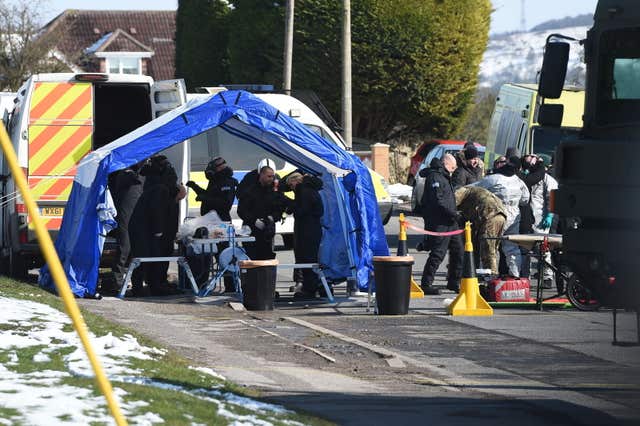
Prime Minister Theresa May has said the European Council is “standing together” on the Salisbury nerve agent attack as she warned the threat from Russia “respects no borders”.
Mrs May was speaking after winning the backing of EU leaders who accepted the only “plausible explanation” for the poisoning of former double agent Sergei Skripal and his daughter, Yulia, was that Russia was responsible.
In a further development it emerged the European Union was recalling its ambassador to Moscow “for consultations”, although the move was not a formal sanction.
In a joint statement the council had said its members will “co-ordinate on the consequences to be drawn in the light of the answers provided by the Russian authorities”.
Mrs May earlier set out a detailed account of the evidence which led the Government to point the finger of blame at the Kremlin during an EU summit in Brussels.
European Council president Donald Tusk said: “(The) European Council agrees with UK government that highly likely Russia is responsible for Salisbury attack and that there is no other plausible explanation.”
European Council #EUCO conclusions on #SalisburyAttack online: https://t.co/2RJF6XnNKL
‘The European Council agrees with the UK government’s assessment that it is highly likely that the Russian Federation is responsible and that there is no plausible alternative explanation’
— EU Council Press (@EUCouncilPress) March 22, 2018
Welcoming the support from the other 27 EU leaders, Mrs May said is was right they were standing together.
She said: “I welcome the fact that the EU Council has agreed with the United Kingdom Government’s assessment that it is highly likely that Russia was responsible for the attempted murder that took place on the streets of Salisbury and that there is no plausible alternative explanation.
“The threat that Russia poses respects no borders and it is a threat to our values and it is right that here in the EU Council we are standing together to uphold those values.”
Meanwhile, Dutch prime minister Mark Rutte said the European Union’s ambassador to Russia is being recalled to consult with Brussels over the attack.
Mr Rutte said the diplomat was being recalled as a “measure” and the move was not a “sanction” against Moscow.

The EU statement came as a welcome boost to Mrs May in her increasingly bitter stand-off with Moscow – and reports suggested that as many as five EU countries – France, Poland and the three Baltic states – could now follow Britain’s lead by expelling suspected Russian spies.
On Monday foreign ministers of the 28-nation bloc had issued a statement voicing “unqualified solidarity” with the UK, but stopping short of blaming the Russians.
In her address to the other 27 EU leaders over dinner, the Prime Minister set out the four pillars of evidence which the UK believe put Russia in the frame:
– The positive identification by experts at Porton Down of the specific chemical used as a type of Novichok nerve agent;
– The knowledge that Russia has produced this agent within the last 10 years and remains capable of doing so;
– Russia’s record of conducting state-sponsored assassinations; and
– Britain’s assessment that Russia views defectors as suitable targets for assassination.

German chancellor Angela Merkel was one of several leaders to express solidarity with the UK after meeting Mrs May and France’s president Emmanuel Macron on the margins of the summit to discuss the incident.
Lithuania’s president Dalia Grybauskaite disclosed the she was considering following Britain’s example by expelling Russian spies from her country.
Resistance to a firmer line with Moscow apparently came from Greece, whose prime minister Alexis Tsipras said: “We have to express solidarity to the British people for the Salisbury case, but we also need to be responsible on that issue.”
Earlier on Thursday, it was announced that the police officer exposed to the Novichok nerve agent had been discharged from hospital.
Chief Constable Kier Pritchard has read statements on behalf of DS Nick Bailey & his wife Sarah, during a press conference held at #Salisbury District Hospital. @wiltspoliceCC also read a statement on behalf of the Force – all are available on our website https://t.co/FLKjLj0gbE pic.twitter.com/vwWAfmfRJ7
— Wiltshire Police (@wiltshirepolice) March 22, 2018
In a statement Detective Sergeant Nick Bailey said he had been “overwhelmed” by the messages of support, but acknowledged: “Normal life for me will probably never be the same.”
Meanwhile a Court of Protection judge has given doctors permission to take blood from the Skripals – who remain in a critical condition in hospital – and to provide samples to chemical weapons experts.
Mr Justice Williams said he had been asked to make decisions because Mr and Ms Skripal were unconscious and therefore unable to give their consent to blood samples being taken or tested.


Comments: Our rules
We want our comments to be a lively and valuable part of our community - a place where readers can debate and engage with the most important local issues. The ability to comment on our stories is a privilege, not a right, however, and that privilege may be withdrawn if it is abused or misused.
Please report any comments that break our rules.
Read the rules hereComments are closed on this article